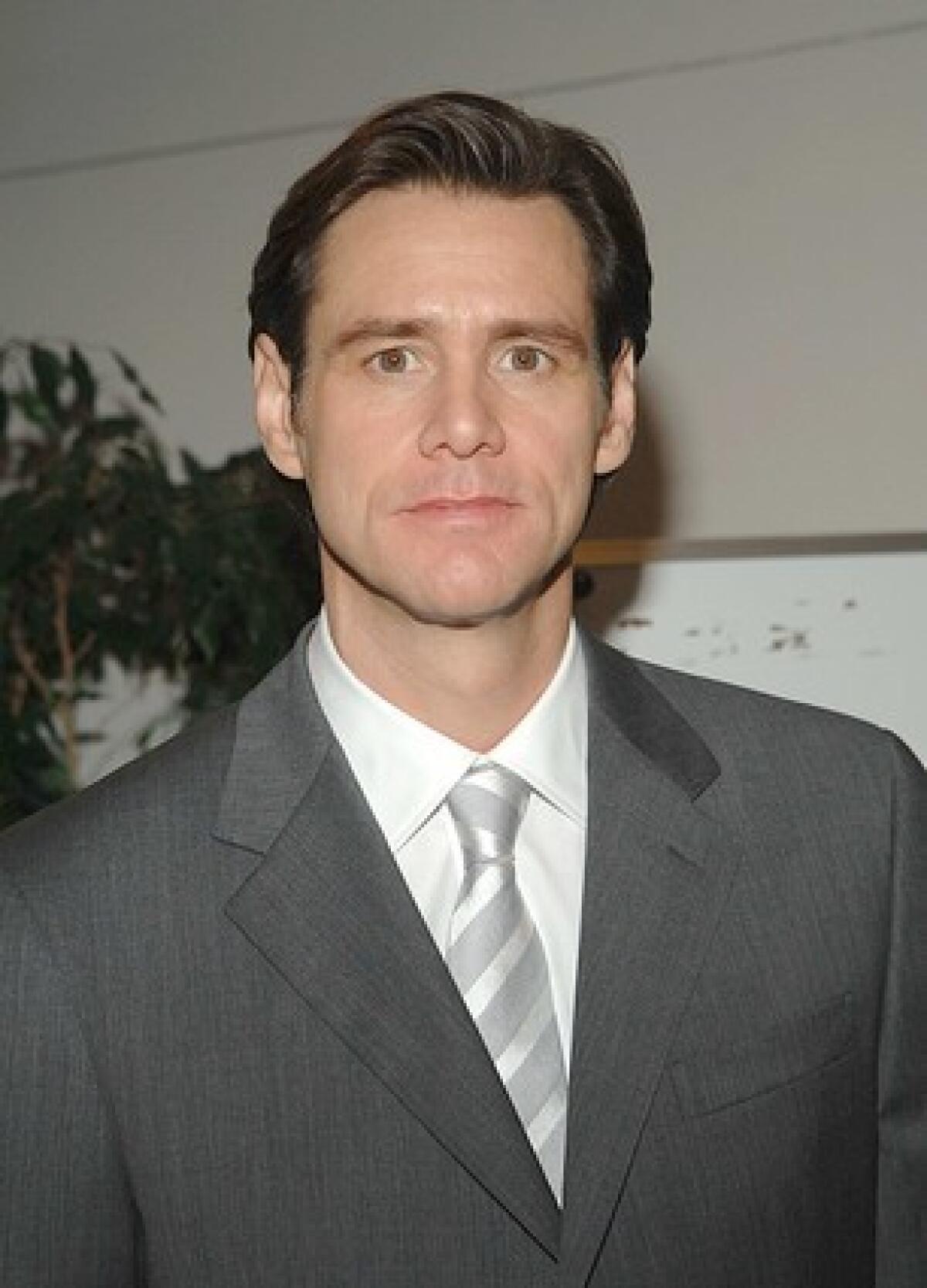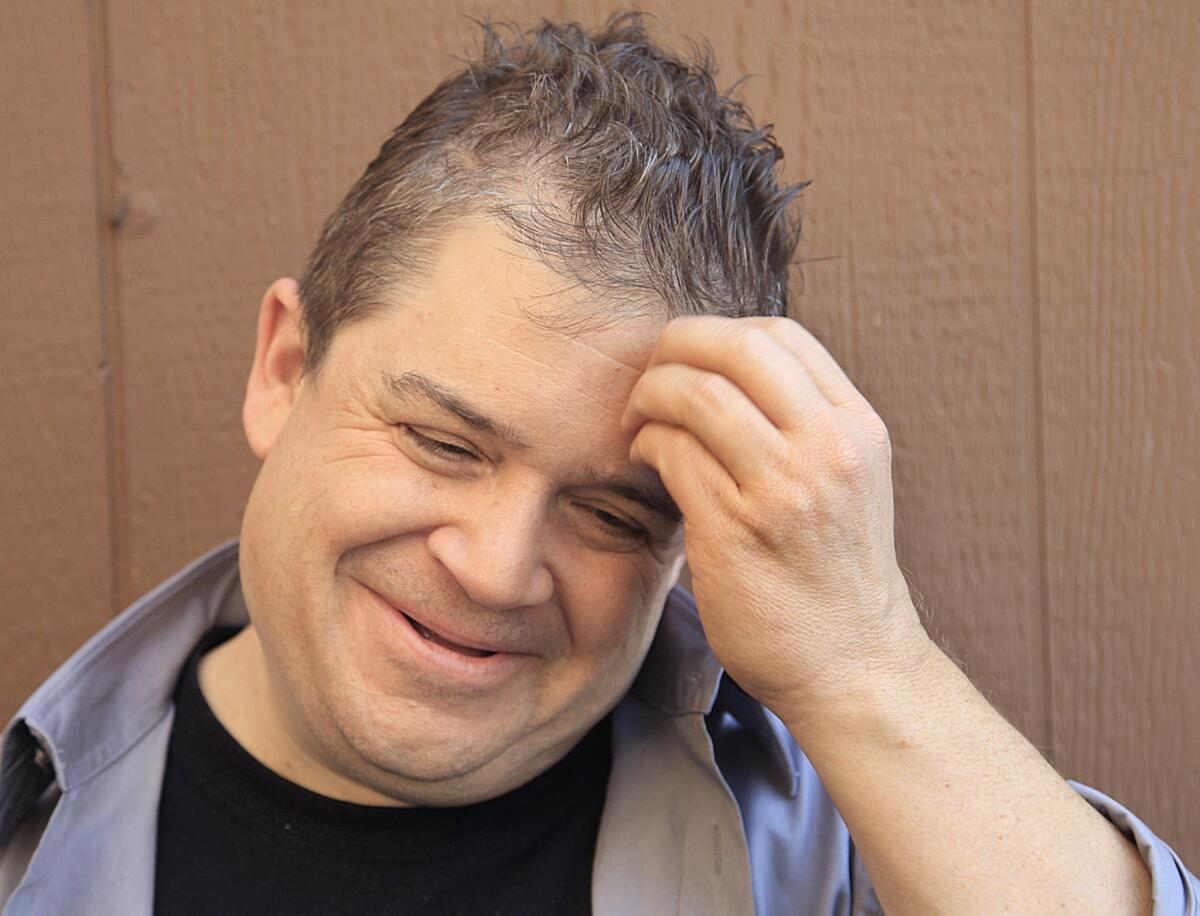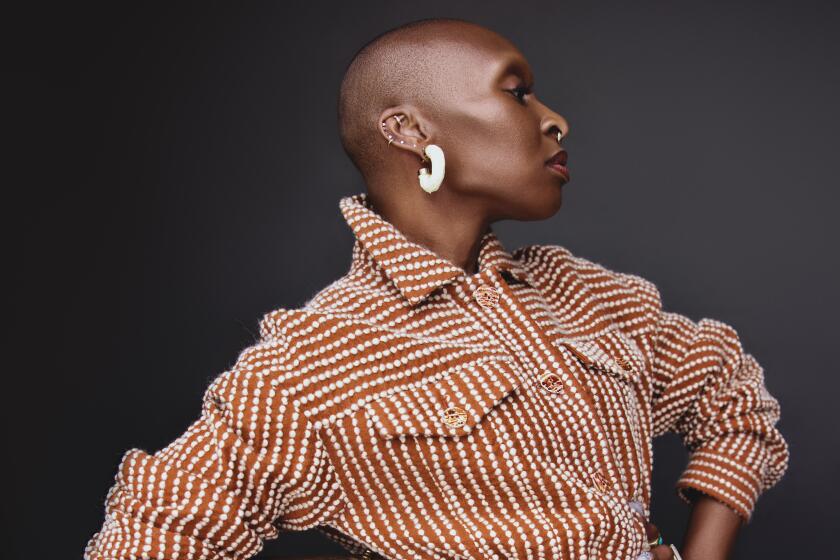Comic Gary Gulman fights depression with laughter in his HBO special and live shows
- Share via
Gary Gulman had hit rock bottom.
It was the summer of 2017 and the comedian, whose wry observational humor made him one of the rare comics to appear on every major late-night TV show, was slumped on a stool at the edge of a tiny stage above a Chinese restaurant in Boston’s Harvard Square, his impish grin replaced by a grimace.
“I have a mental illness. I have a severe mental illness,” he moaned quietly into a microphone. “It’s excruciating. This is like a cosmic bottom.”
At first the small audience wasn’t sure whether that was part of the act or a cry for help. Turns out it was a little bit of both.
What none of the paying customers knew was that Gulman had been in and out of the hospital over the previous 17 months dealing with depression so severe he underwent electroconvulsive therapy that involves attaching wires to his head and shocking his brain, triggering a seizure.
So he wasn’t feeling very funny.
“I didn’t intend to get onstage,” the 49-year-old Gulman recalled of that night. But since hooking his brain up to a pair of jumper cables hadn’t completely healed him, he figured he’d give comedy a try.
“For some reason I felt that there would be some redemption with my illness if I could somehow turn it into something that everybody laughed at,” Gulman says now. “There’s this sort of cliché in comedy that if something bad happens and you get a joke out of it, then it’s worth the thing happening.”
More than two years later, Gulman, who returns to touring with shows this week at Largo at the Coronet on La Cienega, is stable but not cured. Every morning, he admits, the battle begins anew, just as it does with people battling diseases such as substance addiction or cancer.
“One day at a time,” he said.
It took Gulman decades to stand up to his depression. So it was as both a public service and a form of therapy that he made that struggle the focus of the recent HBO special “Gary Gulman: The Great Depresh,” which debuted in October and is available on HBO on Demand, HBO GO and HBO Now.
It is unsparing and painful at times. But in keeping with the comic spirit of mining every personal tragedy for humor, it is also funny.
“From an early age I noticed that I would feel better when I was making people laugh,” said Gulman, who exhibited symptoms of depression as a child but wasn’t diagnosed with the disease until his freshman year of college. “A number of different things were going on. I was getting attention. I was deflecting any kind of criticism.
“There’s a feeling of acceptance when people are laughing at things you say. I wonder if a lot of comedians learned that early on and they just keep seeking that out.”
Gulman is far from the first comedian to battle depression but he may be one of the lucky few to have wrestled it to a draw. The list of comedians who have had depression is a roster of all-stars that includes Lenny Bruce, Woody Allen, Jim Carrey, Chris Farley, Ralphie May, Maria Bamford, Rodney Dangerfield, Richard Lewis, Patton Oswalt, Jim Jefferies and Sarah Silverman.
Many comics have been raised on the belief there’s a link between comedy and depression.
“If I remove the depression, then I’m going to remove the funny,” said Gulman’s friend, comedian Robert Kelly, who also dealt with depression. “It’s a myth.”
Yet it’s one that has long interested psychoanalysts and other mental health experts.

Sigmund Freud believed comedians told jokes to relieve anxiety, while a 2014 survey in the International Journal of Cardiology, which looked at 53 British comics, concluded, “Elite comedians are at increased risk of premature death compared to their less funny counterparts.”
But that oft-cited study was based on self-reported results, which don’t always reflect the subjects’ current level of functioning. Ildiko Tabori, a Westside psychologist, said there have been few other studies on the links between comedians and depression, leaving mostly speculation and anecdotes to fill the void.
What is certain, however, is that the comedy world loses top performers to suicide every year. Greg Giraldo earned degrees from Columbia and Harvard Law School and worked as an attorney before becoming a comic, a profession in which, he said in an interview with Psychology Today, he was “constantly tortured by a sense of failure” and self-hatred. He died alone in a New Jersey hotel room from an overdose of prescription drugs in 2010.
The equally brilliant Richard Jeni had been diagnosed with severe clinical depression and was taking antidepressants the morning he shot himself in the head in the bedroom of his West Hollywood home in 2007.
Then there’s Robin Williams, who was suffering from depression, anxiety and dementia — a trifecta of disorders his wife, Susan Schneider, described as “the terrorist inside my husband’s brain” — when he hanged himself in his Northern California home in 2014.
Tabori, 48, has yet to find a direct tie between being funny and being depressed. After growing up watching stand-up on TV and listening to Steven Wright comedy albums, she has worked the last nine years as the in-house psychologist at the Laugh Factory in Hollywood, brought on by club owner Jamie Masada partly in reaction to the deaths of Giraldo and Jeni. Tabori’s former psychological assistant, James Harris, also works at the club, believed to be the only one in the country employing mental health professionals.
The position has given Tabori an appreciation for the work of comedians — and their struggles.
“They’re funny because they look at life a little bit differently than the rest of us. And they put a different bent on it that makes us laugh,” said Tabori, whose 6-year-old rescue pet, Johnny Carson, now a therapy dog, has the run of the Laugh Factory’s upstairs offices. “They’re funny because they’re funny. They’re not funny because they’re depressed.”
Which isn’t to say they aren’t depressed; they are. Oswalt believes part of the reason for that may stem from the creative thinking Tabori says produces that laughter.
“I think anyone in the creative arts is prone to it because part of being creative is exploring other voices and almost being over-empathetic in order to see things about the world that other people don’t see,” said Oswalt, whose wide-ranging career has included dramatic roles in movies and television and comedy writing as well as stand-up.
“There’s a risk in doing that,” he continued. “Your psyche and your personality can begin to fracture a little bit if you’re not careful.”
Confronting that is often the only way to combat it. As a result Oswalt, who deals with his depression with daily medication and weekly talk-therapy sessions, bristles at those who mock successful entertainers and athletes for opening up about a condition that is an illness, not a mood.

“That would be like going, ‘Hey, you’re a millionaire. Why do you have a cold?’” he said. “Depression is not a situational thing. It is a chemical imbalance and a physical disease. It has nothing to do with, ‘Oh, look how successful you are. There’s no reason to be sad.’ That’s what’s so scary about depression: A lot of times you’re sad for no reason.”
And if you’re a comedian, there may be no one close to turn to since the job often requires months traveling from one lonely hotel room to another, separated from a normal support system of friends and family. Then there’s the fact that stand-up is often deeply personal, like opening a vein and bleeding in front of a crowd of strangers.
And that can be dangerous.
Gulman’s act, for example, features reminiscences about his childhood, unique twists on common experiences and goofy observations on popular culture. When the audience gets the humor, it’s affirmation. When they don’t, it can be devastating.
“Making a room full of strangers laugh is very intoxicating. I wanted to replicate that feeling after the first time I got onstage,” said Gulman, who gave up plans to become a CPA when he began performing in public at 23. “But it’s a 25-, 24-year thing to learn that I couldn’t allow my self-worth to be determined by how the audience reacted because I had no control over that.”
At its worst the depression forced Gulman to move back into his mother’s house in Peabody, Mass., where, his wife Sade remembered, all he did was cry and sleep. When he was awake, he was contemplating suicide.
And though he lied to most people about his condition, one friend saw through those fibs and told him she didn’t think he’d last more than four years.
Therapy, he says on the HBO special, saved his life “over and over again.”
“Depression manifests differently in different people. All I wanted to do was sleep,” he said. “I couldn’t summon the energy to do even the smallest tasks. Then there’s this endless critical rumination in my head of either regret or specific criticisms about how I’m doing.
“That’s a very difficult thing for artists because you rely on having some objectivity as far as your work goes. When I’m depressed, nothing can get out, because I decide that everything is worthless and derivative and will expose me as a talentless fraud.”
Gulman also battled anxiety, which he likened to the feeling you get when you realize you left something enormously important at home or when you’re late for an important meeting.
“Just this feeling of dread combined with despair,” said Gulman, who would bite his lip until it bled.
That made being funny difficult. So between the start of 2015 and the middle of 2017 Gulman, whose comedy is more like art, relying heavily on the nuances of language to fuel finely crafted bits, wrote almost nothing. And since he couldn’t stand for more than a few minutes at a time, doing a stand-up set was out of the question.
“I probably lost 2½ years of productivity,” he said.
But he didn’t lose his life. Instead, he’s coming back stronger than ever.
In addition to writing for the 74-minute HBO special, he came up with another 80 to 90 minutes of material for his aptly named Peace of Mind tour, this week at the Largo.
Gulman has already booked 34 dates in more than two dozen cities for the start of his most ambitious tour in years, one that will help him reclaim both his career and his sense of self-worth.
That’s not the only goal, though, because if Gulman has learned anything over the past three years it’s that laughter, while a powerful medicine, can’t cure everything. But just by talking about his depression, he believes he has given others the courage to step up and confront their demons as well.
Noted Gulman: “I had never done shows where people were coming up to me and thanking me and telling me how grateful they were for making them feel less alone, for making them feel seen and understood.”
More to Read
The biggest entertainment stories
Get our big stories about Hollywood, film, television, music, arts, culture and more right in your inbox as soon as they publish.
You may occasionally receive promotional content from the Los Angeles Times.











